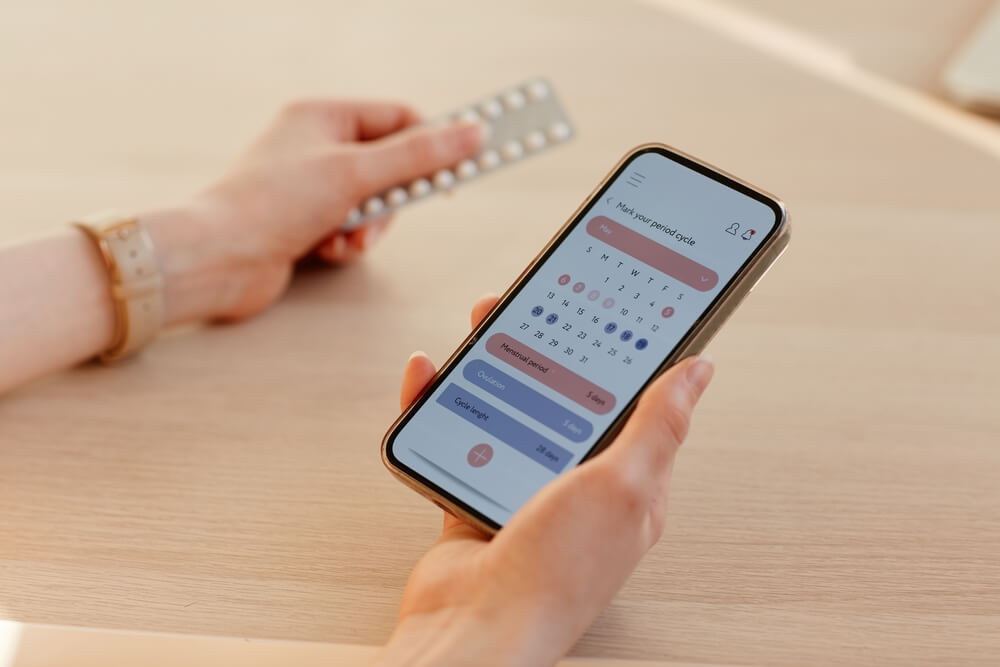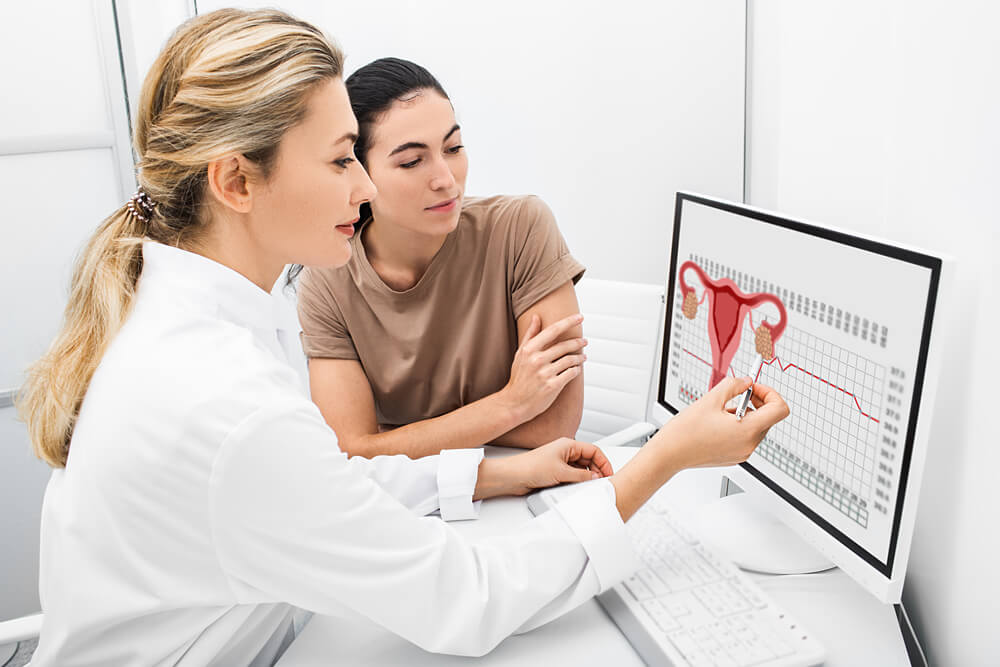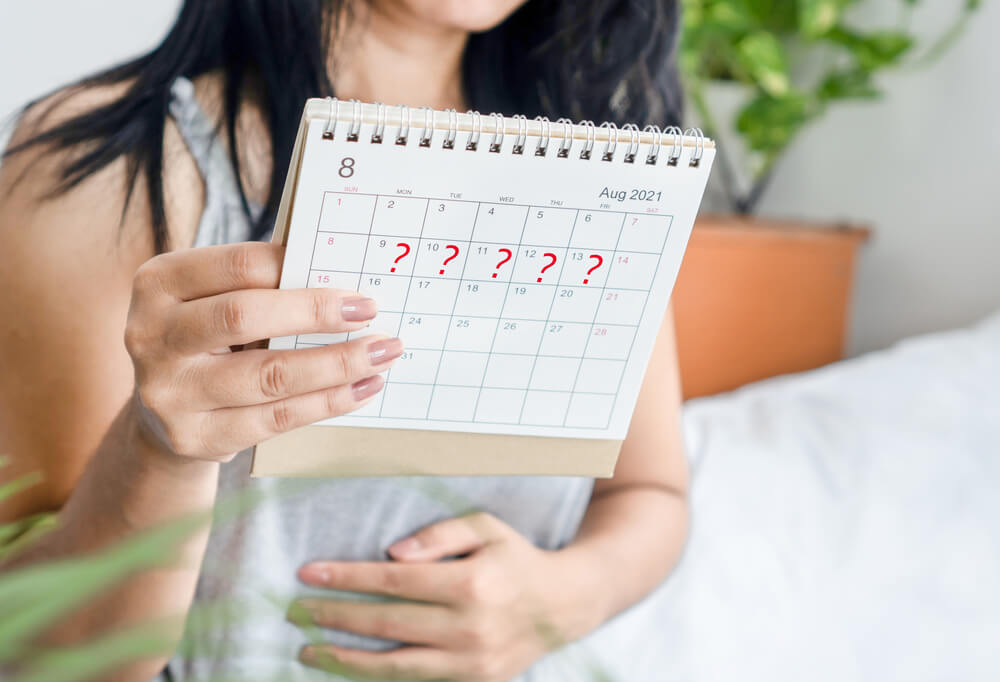Late ovulation can leave you fretting and concerned about your pregnancy window of opportunity if you’re trying to conceive. However, being informed can help ease your anxiety, so it’s a good idea to learn more about what is late ovulation, how it happens, what it means, and how to treat it. This article discusses this topic from all angles, so read on to have your questions answered, or contact Women’s Care of Bradenton – OB-GYN today to get the professional assistance you need.
Menstrual Cycle 101
A brief look at the four menstrual cycle phases can help matters before we look at what is late ovulation. To begin with, your body produces different hormones, each with a specific function and unique role in the reproductive process. During the proliferative stage, a single ovarian follicle usually matures to produce the dominant egg needed during the ovulatory phase.
Due to a hormonal spike, the egg moves away from its follicle and ends up in one of the fallopian tubes, awaiting fertilization for 24-36 hours. If fertilization doesn’t happen, the pregnancy window of opportunity closes, and the egg disintegrates.
Progesterone is a pregnancy hormone that thickens the uterus lining in preparation for implantation. After the ovulatory stage follows the luteal phase, where the follicle that produced the dominant egg becomes what is known as a corpus luteum that produces progesterone. The corpus luteum will continue to produce progesterone-only if the egg is fertilized.
Otherwise, it ceases progesterone production, which triggers the lining to shed, kickstarting menstruation. Then, once your period is over, you’re back to square one with the maturation of another ovarian follicle, with various hormones regulating everything from start to finish.
What Is Late Ovulation?
The ovulatory stage usually occurs in the middle of your menstrual cycle. So, if you have a regular cycle of 28 days, you can expect to ovulate on day 14, although this depends because women tend to have different cycles. Women with regular cycles can ovulate on days 17-19 if they have a short luteal phase. In this case, ovulation is delayed if it occurs on day 21 or later.
For women with longer cycles of 35 days or more, it’s not unusual to ovulate on day 21 or later or not at all on some cycles.
That said, it’s essential to remember that every woman has a unique cycle. If you’re familiar with the average cycle length, ovulation typically happens around the middle of that cycle or between days 11 and 21. If not, you could be dealing with a case of late ovulation, which may impact your fertility.
Another truth that has been acknowledged is there’s no hard and fast answer to the question, “What is late ovulation?” Ovulation has been known to happen as early as day seven or six and as late as day 19 and beyond. Although a woman’s cycle is 28 days on average, it could be much shorter or longer, so the ovulation stage can occur earlier or later.
How Late Can You Ovulate?

As mentioned, ovulation generally occurs in the middle of the menstrual cycle or from day 11 up to 21. When it comes to how late can you ovulate, it is usually considered late when it occurs after day 21. If you have an irregular cycle lasting 35 days or longer, ovulating at day 21 or later is normal.
One prospective study looked at the timing of the “fertile window” and involved more than 200 women planning to get pregnant. According to the results, ovulation occurred as early as the eighth day of the menstrual cycle, up to the 60th day. So, if you’re wondering, “How late can you ovulate?” the most accurate answer is it varies, and according to the study, women can’t predict sporadic late ovulation.
Does Late Ovulation Mean Late Period?
If you’re familiar with how the menstrual cycle works, you may also wonder, “Does late ovulation mean late period?” The short answer is yes, it does. If you ovulate late or don’t ovulate at all, this can cause a late period. You may also notice that your period is heavier than usual. This happens after the hormone estrogen stimulates the thickening of the uterus lining.
Delayed ovulation means the hormone progesterone is never released to support pregnancy, so the continued release of estrogen results in more blood building up in the uterine lining.
If you’re TTC (trying to conceive), late ovulation makes it harder to track your cycle, and you might get a visit from Aunt Flo when you least expect it.
However, for most women that wonder, “does late ovulation mean late period?” it’s important to remember that you can still get pregnant during your period. Your pregnancy window of opportunity is not necessarily linked to your menstruation but is dependent on when you ovulate.
Possible Symptoms of Late Ovulation
The topic of delayed ovulation often gives rise to a host of questions such as:
- What is late ovulation?
- Does late ovulation mean a late period?
- How late can you ovulate?
- How do I know if I’m ovulating late?
Most of these questions can be answered by being familiar with your cycle and determining the time of ovulation. Common methods that are used to track the ovulatory stage include:
- Checking the basal body temperature.
- Checking if there are any changes in the thickness of the cervical mucus.
- Using a fertility calculator to determine when you’re most likely to ovulate.
One of the most accurate ways to determine the time of ovulation is to use an ovulation predictor kit or a fertility tracker. This helps track your cycle and your luteal phase and can help you estimate if you’re ovulating based on hormone levels.
In any case, the symptoms of ovulation include:
- Light spotting
- A higher body temperature
- High libido
- Changes in vaginal discharge
- Some aches or cramps in your pelvic region.
If you haven’t noticed any of these symptoms, this is probably a sign you haven’t ovulated yet.
Can You Ovulate Late and Still Get Pregnant?
Is late ovulation something you should worry about? For the most part, it shouldn’t be a primary concern unless it’s seriously affecting your emotional health and well-being. If you’re TTC, you may be worried about the link between late ovulation and pregnancy. The good news is it’s possible to ovulate late and still get pregnant.
However, ovulating after day 21 of your cycle can also lower the chances of conception. For starters, it’s harder to predict your cycle when your ovulation is delayed, and you may not know your fertile window, resulting in numerous missed opportunities.
If you want to get pregnant, it’s crucial to have sex before you ovulate. Since sperm can survive in the female reproductive tract for five days or more, there’s a greater chance of conceiving if you have sex two days before ovulation.
Another way that late ovulation can affect the chances of getting pregnant is by impacting the egg’s viability. The egg needs to be fertilized soon after being released for pregnancy to occur. The stress of dealing with late ovulation can wreak havoc with your hormones, worsening your fertility woes, emotional health, and well-being.
Does Late Ovulation Affect Egg Quality?
Another link between late ovulation and pregnancy is that late ovulation may result in an egg of lower quality being released. This usually happens when you consistently experience an irregular cycle, so you’re always ovulating late. In addition, a short luteal phase is delayed ovulation, which can hinder the released egg from implanting successfully in the uterine lining.
Will Delayed Ovulation Affect Pregnancy Tests?
If you’re TTC, chances are you’re always ready to perform a pregnancy test to see if your efforts have paid off this time. In that case, it’s good to know if late ovulation affects pregnancy results. Remember, implantation triggers the human body to start producing human chorionic gonadotropin (hCG), which also ends up in your urine.
Knowing when to carry out a pregnancy test is critical with late ovulation. Therefore, late ovulation can affect pregnancy tests because you might think you ovulated earlier, so if you test too early, you can obtain a negative pregnancy test. However, it’s still possible to get pregnant after ovulating early, and your hCG levels will likely increase in a short amount of time.
Common Reasons for Late Ovulation

In most cases, hormone imbalances are the underlying cause of late ovulation, and they result in long, irregular cycles. Factors that trigger hormonal imbalances include the following:
1. Stress
Stress can be harmful to the human body, especially in women who are trying to conceive. That’s because stress disrupts hormone levels, creating an imbalance that results in late ovulation. Unfortunately, many things can perpetuate high-stress levels, such as daily work pressure, emotional upheavals, and big life changes.
It’s essential to watch out for signs of stress, such as sleep problems, panic attacks, and fatigue. Try and give yourself a break and have enough time to relax and calm down. Also, consider stress management techniques, such as guided mediation and deep breathing.
2. Polycystic ovary syndrome (PCOS)
PCOS is one of the most significant contributors to infertility in women. It’s pretty common, and according to the Office on Women’s Health, it affects between 5%-10% of women aged 15-44. Most women only discover this condition when they have difficulty getting pregnant. PCOS affects hormone levels, which in turn impacts the development of the egg and its release.
If you have PCOS, you may not ovulate during some cycles, if at all. The good news is PCOS can be treated with hormone therapy, medications, birth control pills, or a change in diet or activity.
3. Thyroid Disorders
Thyroid disorders can also contribute to late ovulation and pregnancy difficulties. When it comes to how late you can ovulate, sometimes the controlling factor is the thyroid. This gland is located in your neck, and it’s linked to your pituitary gland, which influences the production of reproductive hormones.
An underactive thyroid results in a condition known as hypothyroidism. This may disrupt your menstrual cycle and stop ovulation. Thyroid malfunction can also lead to irregular periods and infertility, so it’s essential to seek medical attention if you’re not sure why you’re not getting pregnant.
4. Hyperprolactinemia and Breastfeeding
Breast milk production is primarily regulated by the hormone prolactin, which prevents menstruation and sometimes delays ovulation. If the body produces too much prolactin, this results in a condition known as hyperprolactinemia.
Elevated hormone levels can cause longer cycles, and if you have hyperprolactinemia, you may have a short luteal phase, and your periods may stop altogether.
5. Medications
If you’re TTC, you must ask your doctor about the potential side effects of any drug you may be taking. If you’re taking any medication, this could potentially delay ovulation. Some drugs like ibuprofen, aspirin, and other NSAIDS can prevent ovulation. Other drugs like cannabis may also affect ovulation. In addition, remember that hormonal birth control may affect ovulation up to three months or more after stopping oral contraceptives.
6. Luteal phase defect (LPD)
A short luteal phase is defined as lasting ten days or less. According to the Department of Obstetrics and Gynecology of the University of North Carolina, the luteal phase lasts from 12-14 days on average. Although rare, a short luteal phase could be one of the reasons for delayed ovulation.
When your luteal phase is too short, the uterine doesn’t have enough time to thicken and prepare for pregnancy, making it harder to get treated. If you have a luteal phase defect, the first step is to consult a fertility expert.
7. Age and Weight
As you age, the number of eggs available for release decreases, and ovulation occurs less frequently. It’s also normal for teens to experience longer cycles as their reproductive system matures. Weight is also another factor affecting ovulation. Being overweight or underweight can disrupt hormone levels, causing late ovulation or irregular cycles.
Ways to Treat Late Ovulation
The good news is there are ways to address late ovulation once the root cause has been uncovered. For instance, medications are available to treat conditions like PCOS, hyperprolactinemia, and hypothyroidism.
In most instances, you likely won’t need drastic measures to make ovulation more regular and improve your chances of getting pregnant. Instead, simple changes in your lifestyle can make a big difference. For instance, it helps to maintain a healthy diet and exercise regularly. You should also manage your stress levels and avoid smoking or drinking alcohol.
What You Need to Know About Late Ovulation and Pregnancy
There are a few things to know about late ovulation and pregnancy if you’re worried about your chances of getting pregnant. Here are some things to keep in mind:
- Ovulation is a crucial stage in the reproductive cycle. However, it’s not the only factor affecting your chances of getting pregnant. Sometimes there may be another cause, such as blocked fallopian tubes.
- It doesn’t always happen as quickly as expected if you’re trying to get pregnant. Truth be told, it can take many months to get pregnant, and sporadic late ovulation can further delay the process.
- No evidence suggests late ovulation can cause miscarriage. However, delayed implantation that occurs more than eight to 10 days after implantation can increase the risk of miscarriage.
Should You See a Doctor?

Late ovulation is typically associated with prolonged and irregular cycles. If you’re TTC and your cycle is unpredictable, it’s a good idea to consult your doctor. This is also the perfect opportunity to identify other factors affecting your fertility, such as PCOS.
Once you and your doctor figure out the issue, you can get the treatment you need to boost your chances of conceiving and having a healthy pregnancy. In addition, you should feel free to ask your doctor any pressing questions you might have, such as, what is late ovulation, how late can you ovulate, and does late ovulation mean late period.
Generally, you should see a doctor whenever you have concerns about your menstrual cycle, fertility, and ability to conceive or ovulate.
Increase Your Chances of Getting Pregnant – Schedule an Appointment With Women’s Care of Bradenton
Are you looking for infertility treatment and counseling in Bradenton, Florida? We recommend you schedule a consultation with our fertility experts at Women’s Care of Bradenton.
Worrying about late ovulation and its impact on your chances of getting pregnant is normal. We are here to help you identify the underlying cause behind late ovulation and provide treatment that helps restore normal ovulation to improve your chances of conceiving.


